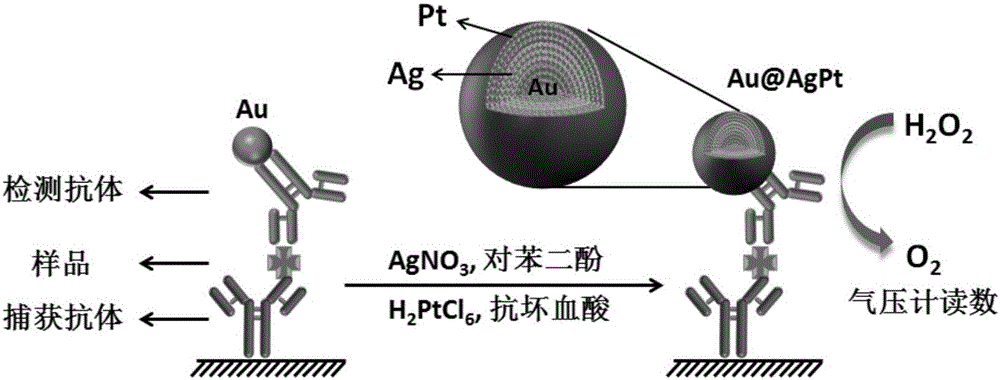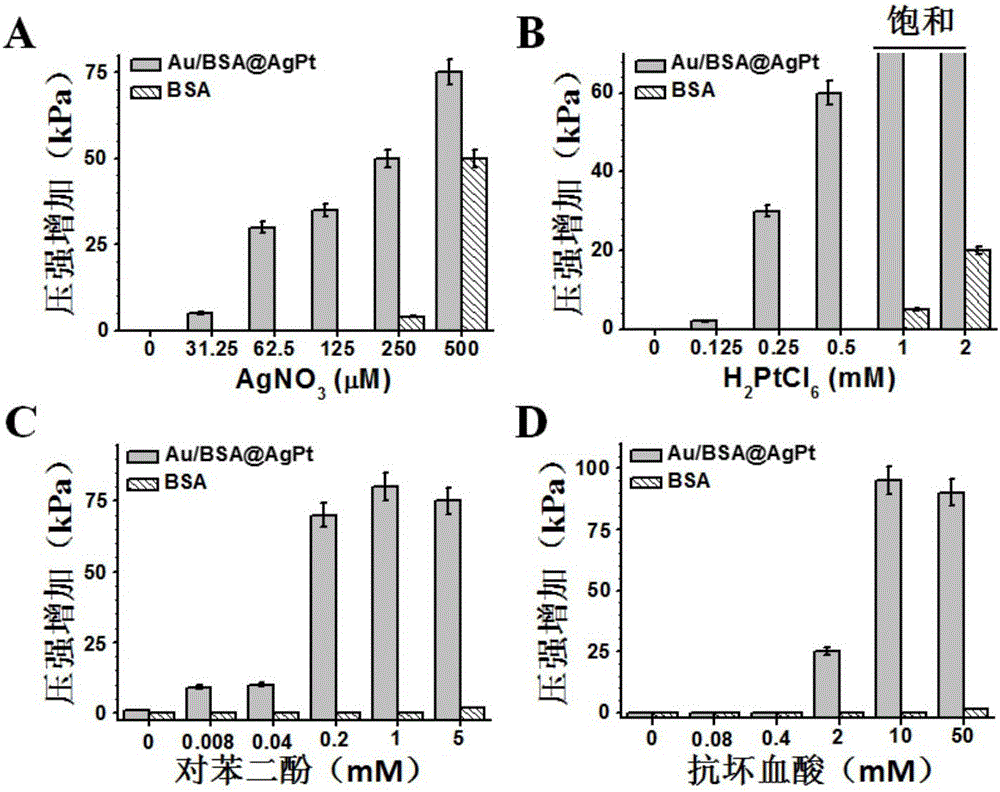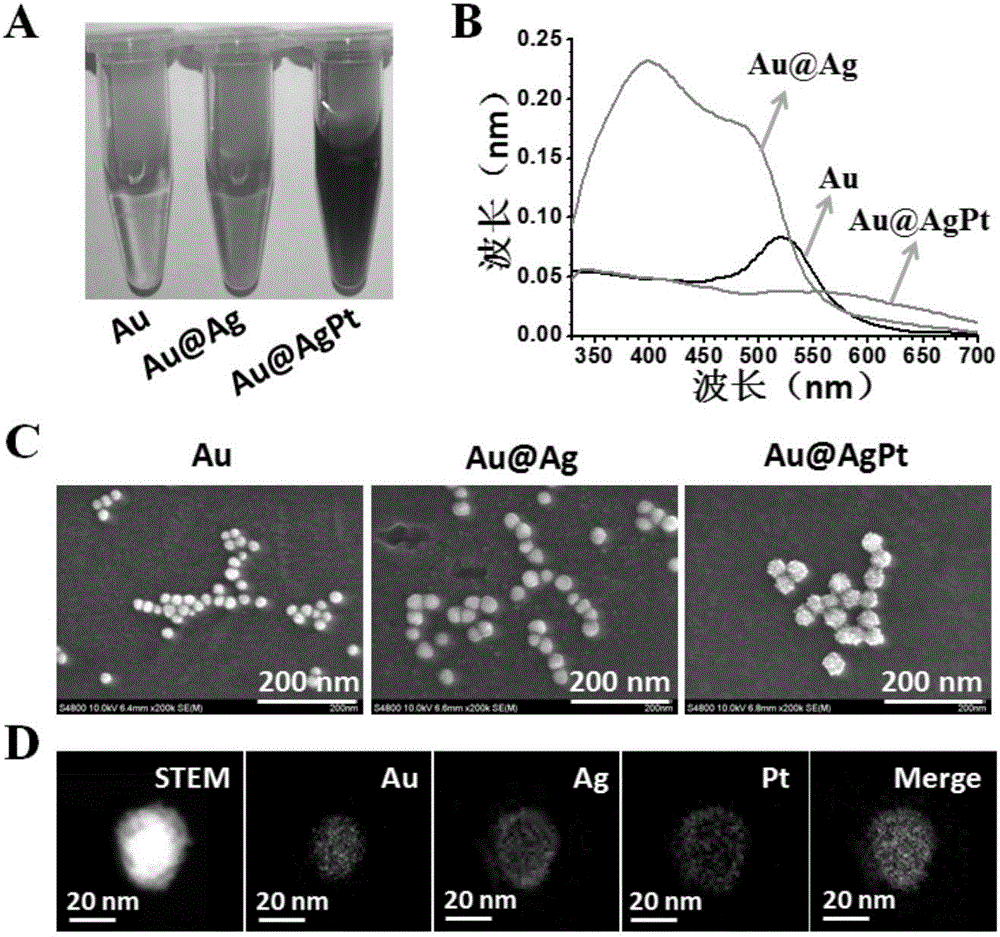ELISA detection method based on nano-enzyme with catalase activity
A catalase and detection method technology, which is applied in the field of ELISA detection of nanozymes, can solve the problems of unstable catalytic activity and reduced catalytic activity of nanozymes, so as to avoid the decline of enzyme catalytic activity, strong catalytic activity, and stable reproduction sexual effect
- Summary
- Abstract
- Description
- Claims
- Application Information
AI Technical Summary
Problems solved by technology
Method used
Image
Examples
Embodiment 1
[0040] Example 1: Preparation of gold nanoparticles
[0041] Add 100mL 0.01wt% chloroauric acid into a round bottom flask, boil and reflux under continuous stirring, add 1mL 3wt% sodium citrate at a constant speed, continue stirring and boiling for 30min, and synthesize gold nanoparticles (AuNPs) with a particle size of 16nm. By adjusting the ratio of chloroauric acid and sodium citrate, gold nanoparticles with different particle sizes can be obtained.
Embodiment 2
[0042] Embodiment 2: the comparative experiment of silver platinum dyeing condition
[0043] In this example, bovine serum albumin (BSA) was used to modify gold nanoparticles. Of course, the gold nanoparticles obtained in Example 1 can also be directly stained with silver and platinum without BSA modification, and nanozymes with peroxidase activity can also be obtained.
[0044] First, 100 μL of 2wt% BSA / PBS solution was added to the 96-well plate, incubated at 37° C. for 1 h, and washed three times with 300 μL of PBS. Subsequently, 100 μL of 2.5 nM 16 nm AuNPs prepared in Example 1 (no AuNPs were added to the control group), incubated at 37° C. for 1 h, and washed three times with 300 μL of PBS. Then add 300 μL Blocking Buffer (PBS solution containing 2wt% BSA and 0.1wt% Tween20), incubate at 37°C for 1 h, and wash with 300 μL PBS three times to obtain BSA-modified gold nanoparticles Au / BSA, which are wrapped and adsorbed on the surface of a 96-well plate .
[0045] Subseq...
Embodiment 3
[0048] Example 3: Characterization of nanozyme Au@AgPt particles with catalase activity obtained after silver-platinum staining
[0049] Add AgNO to the gold nanoparticles AuNPs obtained in 1mL 2.5nM Example 1 3 solution and hydroquinone and make Ag + and hydroquinone at a final concentration of 125 μM and 0.2 mM, respectively, and reacted at 37° C. for 20 minutes. Washed three times with 300 μL water to obtain Au@Ag particles. Then add H 2 PtCl 6 solution and ascorbic acid and make PtCl 6 2- The final concentrations of ascorbic acid and ascorbic acid were 0.5 mM and 10 mM, respectively, reacted at 37 °C for 20 min, and washed three times with 300 μL water to obtain nanozyme Au@AgPt particles with catalase activity. The gold nanoparticles before and after silver staining were characterized by camera, ultraviolet-visible absorption spectrometer, scanning electron microscope and high-resolution transmission electron microscope.
[0050] The result is as image 3 As shown...
PUM
| Property | Measurement | Unit |
|---|---|---|
| particle diameter | aaaaa | aaaaa |
| particle diameter | aaaaa | aaaaa |
Abstract
Description
Claims
Application Information
 Login to View More
Login to View More - R&D
- Intellectual Property
- Life Sciences
- Materials
- Tech Scout
- Unparalleled Data Quality
- Higher Quality Content
- 60% Fewer Hallucinations
Browse by: Latest US Patents, China's latest patents, Technical Efficacy Thesaurus, Application Domain, Technology Topic, Popular Technical Reports.
© 2025 PatSnap. All rights reserved.Legal|Privacy policy|Modern Slavery Act Transparency Statement|Sitemap|About US| Contact US: help@patsnap.com



